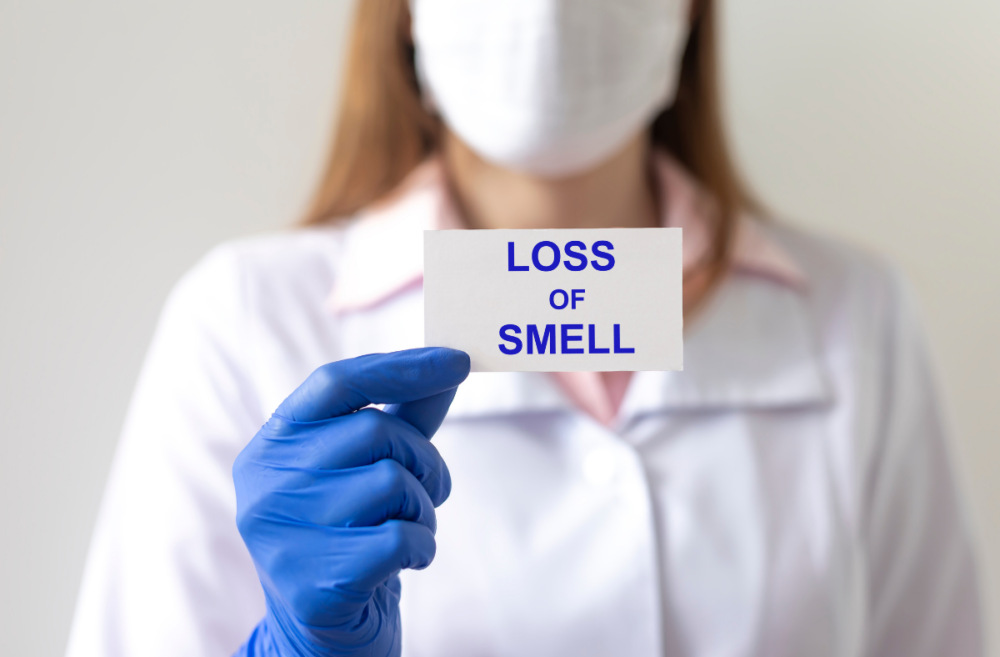
Ten things that we have learnt about smell loss
According to new online research from YouGov and AbScent, the charity that supports people impacted by all types of smell disorders, 18per cent of adults in Britain have personally experienced smell and taste loss themselves and 30 per cent know someone that has, over the past two years.[1]
The study was conducted to mark two years since the NHS and the UK government officially recognised ‘changes to smell and taste’ as a symptom of Covid-19 on the 18th May 2020. Total sample size was 2092 adults.
In the UK there are 11.34 million adults with an impaired sense of smell at any given time. This is equivalent to more than one in five adults.[2],[3]
Chrissi Kelly, Founder, AbScent, said; “In the months leading up to 18th May 2020 there had been a sudden explosion in numbers of people desperate for help in our smell loss support groups. In the two years since, we have witnessed a stunning change in the way that the public view smell and taste disorders. Its impact on mental health has been perhaps the single most sobering side-effect.
“The advice we give is to have hope and there is lots to be hopeful about. The silver lining to the last 24 months in smell has been the recognition within the research and clinical communities of the importance of smell disorders. We have already seen an increase in research studies. In the coming months and years, we will have more to offer patients in the way of treatments. Support from peers who have life experience of the condition remains a crucial element in the management of the condition. AbScent offers safe spaces in our forums where this can happen, together with practical advice and information on smell training. .
Ten things you might not know about smell and taste:
- The sense of smell is the very first to develop and is ready and functioning well before we are born and have taken our first breath. Babies will recognise aromas/tastes their mothers were exposed to during pregnancy and in studies, showed their familiarity and preferences just hours after birth.
- We humans have between six and ten million olfactory neurones, the specialist nerve cells that allow us to smell. Dogs and mice have many more and yet our nose and brain allow us to distinguish more than one trillion scents.
- The olfactory network is one of the most resilient and flexible of the entire human central nervous system and regenerates itself constantly. In effect, you are given a ‘new nose’ pretty much every six weeks or so.
- The nose is also a remarkably sophisticated air conditioner and filters, humidifies and tweaks the temperature of every breath you take just before it enters your lungs. We inhale around 20,000 times each day.
- Your tongue is responsible for taste – sweet, bitter, sour, salty or umami – but it is the nose that allows perception of the nuances of flavour. (Block your nose, blindfold your eyes and see if you can tell the difference between an apple and a crunchy pear or an orange jellybean and a strawberry one.)
- Smell is the only sense that bypasses the thalamus, the part of the brain that acts like a ‘gatekeeper’ for all other sensory and motor signals as they pass. Instead, it goes directly to the amygdala, which is where memory and emotions are processed. That is why scents will often evoke powerful emotions or a return to the past.
- Our nose also has a way of ‘editing’ smells that overcrowd it or become redundant: this is called ‘habituation’ and you will notice that after a little while, the smell of chlorine at the local swimming pool or food cooking in the restaurant will fade away and disappear into the background.
- Losing your sense of smell can increase the likelihood of depression and studies have shown that otherwise healthy people born with non-functioning or ill functioning olfactory bulbs exhibit higher rates of depression. Significantly, people how have experienced childhood trauma have smaller olfactory bulbs than those who report unremarkable childhoods.
- The size of the olfactory bulb appears to be related not just to severity of depression but also to it continuing: patients who respond well to psychotherapy have significantly higher olfactory bulb volume than those who showed no improvement with treatment.
- Studies have shown that rats with stress-induced depression also had fewer smell receptor neurones suggesting that the normal turnover over these cells – normally controlled by the olfactory bulb – might be encouraged by stimulation such as smell training.
Olfactory training has been demonstrated to be helpful for the recovering sense of smell in numerous studies. AbScent’s smell training kits reflect the years of research that have gone into this supportive technique. They come in three varieties, or you can even use our online information pages to build your own.
For hints and tips about how smell training please visit https://abscent.org/learn-us/how-smell-train.
